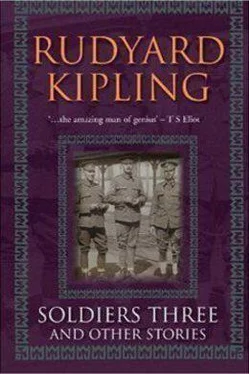Rudyard Kipling - Soldiers Three
Здесь есть возможность читать онлайн «Rudyard Kipling - Soldiers Three» весь текст электронной книги совершенно бесплатно (целиком полную версию без сокращений). В некоторых случаях можно слушать аудио, скачать через торрент в формате fb2 и присутствует краткое содержание. Год выпуска: 2014, Издательство: epubBooks Classics, Жанр: Классическая проза, на английском языке. Описание произведения, (предисловие) а так же отзывы посетителей доступны на портале библиотеки ЛибКат.
- Название:Soldiers Three
- Автор:
- Издательство:epubBooks Classics
- Жанр:
- Год:2014
- ISBN:нет данных
- Рейтинг книги:5 / 5. Голосов: 1
-
Избранное:Добавить в избранное
- Отзывы:
-
Ваша оценка:
- 100
- 1
- 2
- 3
- 4
- 5
Soldiers Three: краткое содержание, описание и аннотация
Предлагаем к чтению аннотацию, описание, краткое содержание или предисловие (зависит от того, что написал сам автор книги «Soldiers Three»). Если вы не нашли необходимую информацию о книге — напишите в комментариях, мы постараемся отыскать её.
Soldiers Three — читать онлайн бесплатно полную книгу (весь текст) целиком
Ниже представлен текст книги, разбитый по страницам. Система сохранения места последней прочитанной страницы, позволяет с удобством читать онлайн бесплатно книгу «Soldiers Three», без необходимости каждый раз заново искать на чём Вы остановились. Поставьте закладку, и сможете в любой момент перейти на страницу, на которой закончили чтение.
Интервал:
Закладка:
'Just before Revelly, my orf'cer bhoy comes out an' sez: "Loose those men an' send thim to their tents!" Scrub Greene wint away widout a word, but Peg Barney, stiff wid the cowld, stud like a sheep, thryin' to make his orf'cer understhand he was sorry for playin' the goat.
'There was no tucker in the draf' whin ut fell in for the march, an' divil a wurrd about "illegality" cud I hear.
'I wint to the ould Colour Sargint and I sez:—"Let me die in glory," sez I. "I've seen a man this day!"
'"A man he is," sez ould Hother; "the draf's as sick as a herrin'. They'll all go down to the sea like lambs. That bhoy has the bowils av a cantonmint av Gin'rals."
'"Amin," sez I, "an' good luck go wid him, wheriver he be, by land or by sea. Let me know how the draf gets clear."
'An' do you know how they did? That bhoy, so I was tould by letter from Bombay, bullydamned 'em down to the dock, till they cudn't call their sowls their own. From the time they left me oi till they was 'tween decks, not wan av thim was more than dacintly dhrunk. An', by the Holy Articles av War, whin they wint aboard they cheered him till they cudn't spake, an' that , mark you, has not come about wid a draf in the mim'ry av livin' man! You look to that little orf'cer bhoy. He has bowils. 'Tis not ivry child that wud chuck the Rig'lations to Flanders an' stretch Peg Barney on a wink from a brokin an' dilapidated ould carkiss like mesilf. I'd be proud to serve—'
'Terence, you're a civilian,' said Dinah Shadd warningly.
'So I am—so I am. Is ut likely I wud forget ut? But he was a gran' bhoy all the same, an' I'm only a mud–tipper wid a hod on my shoulthers. The whiskey's in the heel av your hand, Sorr. Wid your good lave we'll dhrink to the Ould Rig'mint—three fingers—standin' up!'
And we drank.
The Wreck of the Visigoth
(1885)
'Eternal Father, strong to save,
Whose arm hath bound the restless wave,
Who bidst the mighty ocean keep
Its own appointed limits deep.'
The lady passengers were trying the wheezy old harmonium in front of the cuddy, because it was Sunday night. In the patch of darkness near the wheel–grating sat the Captain, and the end of his cheroot burned like a head–lamp. There was neither breath nor motion upon the waters through which the screw was thudding. They spread, dull silver, under the haze of the moonlight till they joined the low coast of Malacca away to the eastward. The voices of the singers at the harmonium were held down by the awnings, and came to us with force.
'Oh, hear us when we cry to Thee,
For those in peril on the sea.'
It was as though the little congregation were afraid of the vastness of the sea. But a laugh followed, and some one said, 'Shall we take it through again a little quicker?' Then the Captain told the story of just such a night, lowering his voice for fear of disturbing the music and the minds of the passengers.
'She was the Visigoth ,—five hundred tons, or it may have been six,—in the coasting trade; one of the best steamers and best found on the Kutch–Kasauli line. She wasn't six years old when the thing happened: on just such a night as this, with an oily smooth sea, under brilliant starlight, about a hundred miles from land. To this day no one knows really what the matter was. She was so small that she could not have struck even a log in the water without every soul on board feeling the jar; and even if she had struck something, it wouldn't have made her go down as she did. I was fourth officer then; we had about seven saloon passengers, including the Captain's wife and another woman, and perhaps five hundred deck–passengers going up the coast to a shrine, on just such a night as this, when she was ripping through the level sea at a level nine knots an hour. The man on the bridge, whoever it was, saw that she was sinking at the head. Sinking by the head as she went along. That was the only warning we got. She began to sink as she went along. Of course the Captain was told, and he sent me to wake up the saloon passengers and tell them to come on deck. 'Sounds a curious sort of message that to deliver on a dead still night. The people tumbled up in their dressing–gowns and pyjamas , and wouldn't believe me. We were just sinking as fast as we could, and I had to tell 'em that. Then the deck–passengers got wind of it, and all Hell woke up along the decks.
'The rule in these little affairs is to get your saloon passengers off first, then to fill the boats with the balance, and afterwards—God help the extras, that's all. I was getting the starboard stern boat—the mail–boat—away. It hung as it might be over yonder, and as I came along from the cuddy, the deck–passengers hung round me, shoving their money–belts into my hand, taking off their nose–rings and earrings, and thrusting 'em upon me to buy just one chance for life. If I hadn't been so desperately busy, I should have thought it horrible. I put biscuits and water into the boat, and got the two ladies in. One of 'em was the Captain's wife. She had to be put in by main force. You've no notion how women can struggle. The other woman was the wife of an officer going to meet her husband; and there were a couple of passengers beside the lascars. The Captain said he was going to stay with the ship. You see the rule in these affairs, I believe, is that the Captain has to bow gracefully from the bridge and go down. I haven't had a ship under my charge wrecked yet. When that comes, I'll have to do like the others. After the boats were away, and I saw that there was nothing to be got by waiting, I jumped overboard exactly as I might have vaulted over into a flat green field, and struck out for the mail–boat. Another officer did the same thing, but he went for a boat full of natives, and they whacked him on the chest with oars, so he had some difficulty in climbing in.
'It was as well that I reached the mail–boat. There was a compass in it, but the idiots had managed to fill the boat half full of water somehow or another, and none of the crew seemed to know what was required of them. Then the Visigoth went down and took every one with her—ships generally do that; the corpses don't cumber the sea for some time.
'What did I do? I kept all the boats together, and headed into the track of the coasting steamers. The aggravating thing was the thought that we were close to land as far as a big steamer was concerned, and in the middle of eternity as far as regarded a little boat. The sea looks hugeous big from a boat at night.'
'Oh, Christ, whose voice the waters heard
And hushed their ravings at Thy word,
Who walkedst on the foaming deep
And calm amidst its rage did keep,—
Oh, hear us when we cry to Thee,
For those in peril on the sea!'
sang the passengers cheerily.
'That harmonium is disgracefully out of tune,' said the Captain. 'The sea air affects their insides. Well, as I was saying, we settled down in the boat. The Captain's wife was unconscious; she lay in the bottom of the boat and moaned. I was glad she wasn't threshing about the boat: but what I did think was wrong, was the way the two men passengers behaved. They were useless with funk—out and out fear. They lay in the boat and did nothing. Fetched a groan now and again to show they were alive; but that was all. But the other woman was a jewel. Damn it, it was worth being shipwrecked to have that woman in the boat; she was awfully handsome, and as brave as she was lovely. She helped me bail out the boat, and she worked like a man.
'So we kicked about the sea from midnight till seven the next evening, and then we saw a steamer. "I'll—I'll give you anything I'm wearing to hoist as a signal of distress," said the woman; but I had no need to ask her, for the steamer picked us up and took us back to Bombay. I forgot to tell you that, when the day broke, I couldn't recognise the Captain's wife—widow, I mean. She had changed in the night as if fire had gone over her. I met her a long time afterwards, and even then she hadn't forgiven me for putting her into the boat and obeying the Captain's orders. But the husband of the other woman—he's in the Army—wrote me no end of a letter of thanks. I don't suppose he considered that the way his wife behaved was enough to make any decent man do all he could. The other fellows, who lay in the bottom of the boat and groaned, I've never met. Don't want to. Shouldn't be civil to 'em if I did. And that's how the Visigoth went down, for no assignable reason, with eighty bags of mail, five hundred souls, and not a single packet insured, on just such a night as this.'
Читать дальшеИнтервал:
Закладка:
Похожие книги на «Soldiers Three»
Представляем Вашему вниманию похожие книги на «Soldiers Three» списком для выбора. Мы отобрали схожую по названию и смыслу литературу в надежде предоставить читателям больше вариантов отыскать новые, интересные, ещё непрочитанные произведения.
Обсуждение, отзывы о книге «Soldiers Three» и просто собственные мнения читателей. Оставьте ваши комментарии, напишите, что Вы думаете о произведении, его смысле или главных героях. Укажите что конкретно понравилось, а что нет, и почему Вы так считаете.












